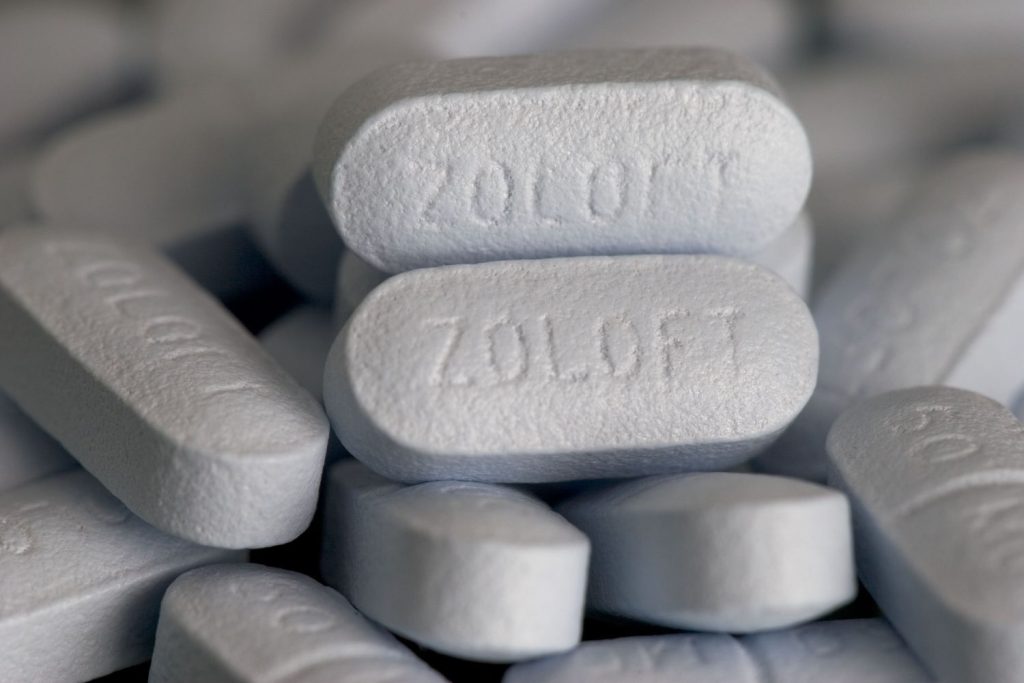:max_bytes(150000):strip_icc():format(jpeg)/VWH-GettyImages-94621338-5cf6b180f1804f47bf146919aa702845.jpg)
| Zoloft Interactions | |
|---|---|
| Substances | Examples |
| Amphetamines | Adderall (amphetamine salts) |
| Other antidepressants | Prozac (fluoxetine), Cymbalta (duloxetine), Elavil (amitriptyline) |
| Certain antipsychotics | Geodon (ziprasidone), Fanapt (iloperidone), Orap (pimozide) |
| Anticoagulants (blood thinners) | Jantoven (warfarin), heparin, Plavix (clopidogrel) |
| Dextromethoprhan | Robitussin-DM, Delsym |
| Certain antiseizure drugs (antiepileptics) | Dilantin (phenytoin) |
| Antiarrhythmics (affect heart rhythm) | Pacerone (amiodarone), Sotalol (betapace) |
| Opioids | Oxycodone, hydrocodone |
| Certain mood stabilizers | Lithium |
| Monoamine oxidase inhibitors (MAOIs) | Nardil (phenelzine), Zyvox (linezolid) |
| Nonsteroidal anti-inflammatory drugs (NSAIDs) | Aspirin |
| Certain herbal supplements | Saint-John’s-wort |
| Triptans | Imitrex (sumatriptan) |
1. Amphetamine Drugs
Serotonin syndrome is a potentially life-threatening condition that can occur when too much serotonin builds up in the body. It is most likely to occur when taking more than one drug that increases serotonin.
Since Zoloft increases serotonin levels, taking it with other drugs that increase serotonin levels can increase the risk for serotonin syndrome. Amphetamines, such as the attention deficit hyperactivity disorder (ADHD) drug Adderall, can also affect serotonin levels. If these drugs are used together, you’ll need to watch closely for signs of serotonin syndrome.
Symptoms can include:
- Agitation
- Confusion
- Fast heart rate
- Flushed skin and excessive sweating
- Movement changes, such as tremor, muscle rigidity, or involuntary movements
- Restlessness
2. Other Antidepressants
Many people are prescribed more than one antidepressant. Taking more than one drug in this class can raise serotonin levels and increase the risk of serotonin syndrome.
Healthcare providers typically avoid prescribing SSRIs like Zoloft in combination with other SSRIs, as well as with drugs from a similar class of drugs called serotonin-norepinephrine reuptake inhibitors (SNRIs).
Drugs from other classes of antidepressants, such as tricyclic antidepressants, may be combined with Zoloft in some cases. However, you’ll still need to watch for signs of serotonin syndrome. Examples of interacting drugs include:
3. Certain Antipsychotics
Certain antipsychotic drugs are contraindicated with Zoloft, meaning they should never be used together. For example, Orap and other brands of pimozide should not be taken with Zoloft, as the combination can cause serious heart rhythm problems.
Healthcare providers will typically try to avoid prescribing these antipsychotic drugs with Zoloft due to the serious risk. Examples of other interacting drugs include:
- Geodon
- Fanapt
- Ormazine (chlorpromazine)
4. Blood Thinners
Blood thinners (anticoagulants) are prescribed to prevent blood clots, but they can also increase the risk of bleeding. Zoloft is also associated with a bleeding risk. When taken together, the risk of bleeding may be significantly increased.
If you do take Zoloft and a blood thinner at the same time, you will need to watch for symptoms of increased bleeding (e.g., nosebleeds, easy bruising, blood in the stools) and receive regular blood work.
Examples of blood thinners include:
- Eliquis (apixaban)
- Jantoven
- Lovenox (heparin)
- Plavix
- Xarelto (rivaroxaban)
5. Dextromethorphan
Dextromethorphan is a cough suppressant. It is used to relieve symptoms of a dry cough, often associated with viruses like the common cold or flu.
Dextromethorphan can increase serotonin levels, so taking it with Zoloft can increase the risk of serotonin syndrome. Dextromethorphan can be found in many cough and cold products, both OTC and prescription. It’s important to be aware of any medications you are taking that also contain dextromethorphan.
Examples of interacting drugs include:
- Delsym (dextromethorphan)
- NyQuil (acetaminophen, dextromethorphan, and doxylamine)
- Robitussin-DM (guaifenesin and dextromethorphan)
- Promethazine and dextromethorphan
If you are taking Zoloft, try to avoid taking dextromethorphan-containing products. If you need a cough remedy, talk to your healthcare provider or pharmacist about safe alternatives for you.
6. Dilantin
Dilantin, a common brand of phenytoin, is a prescription drug used to prevent certain types of seizures. It is known as a narrow therapeutic index (NTI) drug. This means that there is a small window between the drug being effective and potential toxicity. People taking NTI drugs must be carefully monitored to ensure the drug is at appropriate levels in the body at which it is effective but not toxic.
People who take both Dilantin and Zoloft will need to have their Dilantin levels closely monitored, with a possible lowered Dilantin dosage, if needed. This interaction also applies to a chemically similar drug called Cerebyx (fosphenytoin).
7. Drugs That Affect Heart Rhythm
Taking Zoloft with drugs that can affect heart rhythm can increase your risk of severe heart conditions, including arrhythmias (irregular heartbeats) such as long QT syndrome (involving the abnormal duration and shape of the QT interval, a measurement of two main waves within a heartbeat).
While certain antipsychotics can cause this risk, other drugs can also have this same effect. Healthcare providers will typically try to avoid prescribing these drugs with Zoloft due to the serious risks involved:
- Certain antibiotics, such as erythromycin or Avelox (moxifloxacin)
- Heart rhythm medications, such as Pacerone, Betapace (sotalol), Rythmol SR (propafenone), and Prenestyl (procainamide)
- Other drugs such as Prograf (tacrolimus) or mefloquine
- Methadone, an opioid pain medication
8. Opioids
Combining opioid pain medications with Zoloft can increase the risk of serotonin syndrome. Healthcare providers may try to avoid this combination, but in some cases, such as after surgery or a medical procedure, it may be necessary to take both for a short time. Examples of opioids include:
- Acetaminophen/codeine
- Hydrocodone/acetaminophen
- Oxycodone
- Percocet (oxycodone/acetaminophen)
9. Lithium
Lithium is a mood stabilizer used to treat bipolar disorder. Taking lithium with Zoloft may increase the risk of serotonin syndrome. It can also increase the risk of long QT syndrome, although the risk is considered low. People who take lithium with Zoloft may need to be closely monitored for serotonin syndrome and changes in heart rhythm.
10. MAOIs
Monoamine oxidase inhibitors are an older class of drugs used to treat depression. They are not as commonly prescribed due to their side effects and drug and food interactions.
Zoloft is contraindicated with MAOI drugs, meaning they should never be used together. Additionally, at least 14 days should pass between stopping an MAOI and starting Zoloft (and vice versa) to prevent serious complications like serotonin syndrome. If you take either Zoloft or an MAOI, your healthcare provider will not prescribe the other drug. Examples of MAOIs include:
- Nardil
- Parnate (tranylcypromine)
- Zyvox, an antibiotic that is also classified as an MAOI
11. NSAIDs
Nonsteroidal anti-inflammatory drugs are commonly used to help relieve pain, inflammation, and fever.
Zoloft can increase the risk of bleeding, as can NSAIDs. Taken together, then, the risk of bleeding, including gastrointestinal bleeding, could increase. Check with your healthcare provider before taking an NSAID if you take Zoloft.
If your provider approves this combination, you should be alert to signs of bleeding, such as:
- Bleeding gums
- Blood in the stools
- Easy bruising
- Nosebleeds
Examples of NSAIDs are:
- Advil or Motrin (ibuprofen)
- Aleve (naproxen)
- Aspirin
- Meloxicam (by prescription only)
12. Saint-John’s-Wort
Saint-John’s-wort is an herbal dietary supplement that many people take for mild to moderate symptoms of depression, as well as various other conditions. Taking this supplement with Zoloft can increase the risk of serotonin syndrome. Check with a healthcare provider before combining Saint-John’s-wort and Zoloft.
13. Triptans
Triptans are a class of drugs used to treat migraine. Both triptans and Zoloft increase serotonin. The combination of a triptan with Zoloft can increase the risk of serotonin syndrome, especially after starting Zoloft or with a dose increase.
If your healthcare provider prescribes a triptan with Zoloft, you will be carefully monitored for serotonin syndrome. Examples of triptans are:
- Imitrex
- Maxalt (rizatriptan)
- Relpax (eletriptan)
14. Alcohol
According to the prescribing information, people who take Zoloft should avoid drinking alcohol. Additionally, people who are taking Antabuse (disulfiram) for alcohol use disorder should not take Zoloft oral solution, as the liquid solution contains alcohol and could cause a serious reaction if taken with disulfiram. Talk to your healthcare provider if you have any questions or concerns about alcohol use.
When to Avoid Zoloft Completely
The prescribing information for Zoloft lists several contraindications, which means Zoloft should never be taken under these circumstances. The list of contraindications is as follows:
- People who are allergic to sertraline or any ingredient in the medication
- People who are taking the medicine pimozide
- People who are taking an MAOI or have stopped taking an MAOI within the past 14 days
- People who take the drug disulfiram should not take Zoloft oral solution (liquid)
The prescribing information also states that you should avoid alcohol while taking Zoloft.
Summary
Zoloft is a medication commonly prescribed to treat depression and other mental health conditions. There are various drug interactions to be aware of when taking Zoloft. Some medications must be completely avoided, while others may be used cautiously with close monitoring.
The drug interactions in this article are common examples but are not a complete list of every possible Zoloft interaction. Before taking Zoloft, tell your healthcare provider about all the medications you take, including prescription and OTC drugs, vitamins, and supplements. Your healthcare provider can give you medical advice on potential interactions and how they may affect you.








